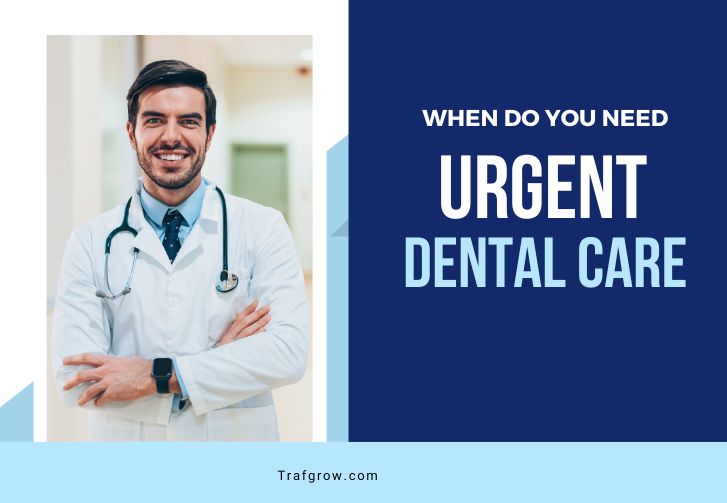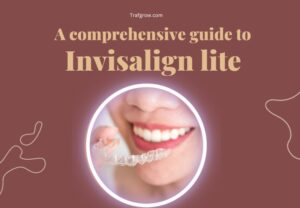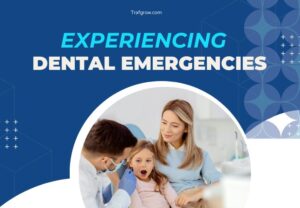
Urgent Dental Care
Dental emergencies can strike unexpectedly, leaving you in excruciating pain and desperate for immediate relief. Whether it is an unbearable toothache, a broken tooth, or a knocked-out tooth, knowing where to find an emergency dentist can make all the difference.
This post aims to explore the importance of urgent dental care in London. Moreover, we will also have a look at what is considered a dental emergency and what’s not.
Without further ado, let us get straight to the topic:
Importance of urgent dental care
Urgent dental care plays a vital role in maintaining oral health and addressing dental emergencies promptly. While regular dental check-ups and preventive care are crucial for overall dental well-being, there are instances when immediate attention is required. Understanding the importance of urgent dental care can help individuals make informed decisions and seek timely treatment when faced with dental emergencies.
What qualifies as a dental emergency and what doesn’t?
Determining what is considered a dental emergency and what is not can sometimes be challenging. While it is always best to consult with a dental professional to evaluate your specific situation, here are some general guidelines to help you differentiate between dental emergencies and non-emergency dental issues:
Understanding Tooth Sensitivity: Causes, Symptoms, and Treatment
Dental emergencies may include:
- Severe toothache: Intense and persistent tooth pain that affects your daily activities.
- Knocked-out tooth: When a tooth is completely displaced from its socket, immediate attention is crucial for the best chance of saving the tooth.
- Broken or fractured tooth: If a tooth is significantly damaged, causing pain or exposing nerves, it may require immediate care.
- Abscess or facial swelling: A dental abscess is a serious infection that can lead to swelling, pain, and sometimes difficulty in breathing or swallowing. Immediate treatment becomes all the more important to prevent the infection from spreading.
- Uncontrolled bleeding: If you experience severe and continuous bleeding from the mouth, it requires immediate attention.
- Trauma or injury to the jaw: Any significant impact or injury to the jaw that causes pain or difficulty in opening or closing the mouth should be addressed promptly.
- Loose or dislodged tooth: If a tooth becomes loose or partially dislodged, immediate dental care is needed to stabilize and save the tooth.
- Damaged dental restorations: If a filling, crown, or other dental restoration becomes loose or breaks, it may require urgent attention to prevent further damage or discomfort.
Non-emergency dental issues are:
- Routine check-ups and cleanings: Regular preventive care appointments are not considered emergencies but are essential for maintaining oral health.
- Minor tooth sensitivity: Occasional sensitivity to hot or cold substances that subsides quickly and does not interfere with daily activities.
- Small chips or cracks: Minor chips or cracks in the teeth that do not cause pain or expose nerves.
- Mild toothache: Mild, intermittent toothaches that are manageable and do not severely impact daily functioning.
- Lost filling or crown (without pain): If a filling or crown comes out but does not cause pain or discomfort, it can typically wait for a scheduled dental appointment.
If you are unsure whether you have a dental emergency, it is always better to contact your dentist for guidance.
The Role of emergency dentists
When dental emergencies strike, the role of emergency dentists becomes crucial in providing prompt and efficient assistance. They understand the urgency and importance of immediate care. And their expertise allows them to address emergencies swiftly. Here is how emergency dentists can help you with:
- Immediate availability: Dental emergencies can occur at any time, often outside of regular dental office hours. Emergency dentists are available during evenings, weekends, and even holidays. This means that you have access to timely care when emergencies arise.
- Rapid diagnosis: Emergency dentists possess the expertise to quickly diagnose dental emergencies and determine the appropriate course of action. Through their training and experience, they can assess the severity of the situation and identify the underlying cause of the problem.
- Immediate pain relief: Dental emergencies are often accompanied by intense pain and discomfort. Emergency dental care London prioritizes providing immediate pain relief to patients. They may administer local anaesthesia, prescribe pain medications, or employ other pain management techniques to alleviate discomfort swiftly.
- Swift treatment: Emergency dentists are skilled in performing quick dental procedures to address emergencies effectively. Whether it is repairing a broken tooth, treating an infection, or re-implanting a knocked-out tooth, they have the necessary tools to carry out these treatments promptly.
- Follow-up care: Emergency dentists not only provide immediate assistance but also offer follow-up care. If further treatment or specialized dental procedures are required, they can recommend the appropriate dental professionals or specialists.
In times of dental emergencies, seeking immediate care from an emergency dentist is crucial. They play a vital role in providing prompt assistance, relieving pain, and preventing further complications. With their expertise and availability, emergency dentists ensure that patients receive the urgent dental care they need.
At Emergency Dentist London Pro, we ensure patients receive expert care by offering comprehensive treatment options and referrals for follow-up care. If you are keen to maintain your long-term oral health in emergency situations, do not hesitate to connect with us. We are always available to provide you with the urgent dental care in London you need.








